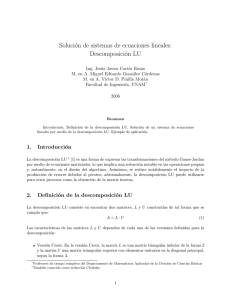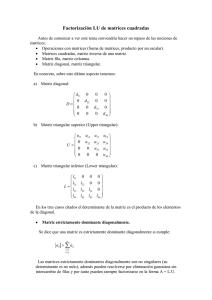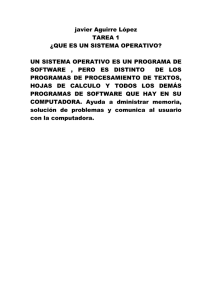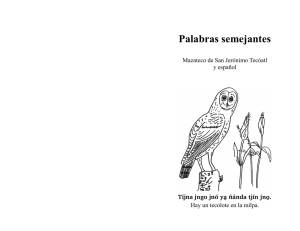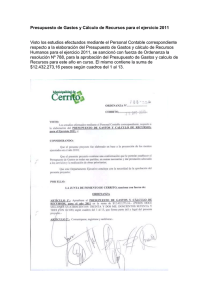ejercicios resueltos
Anuncio
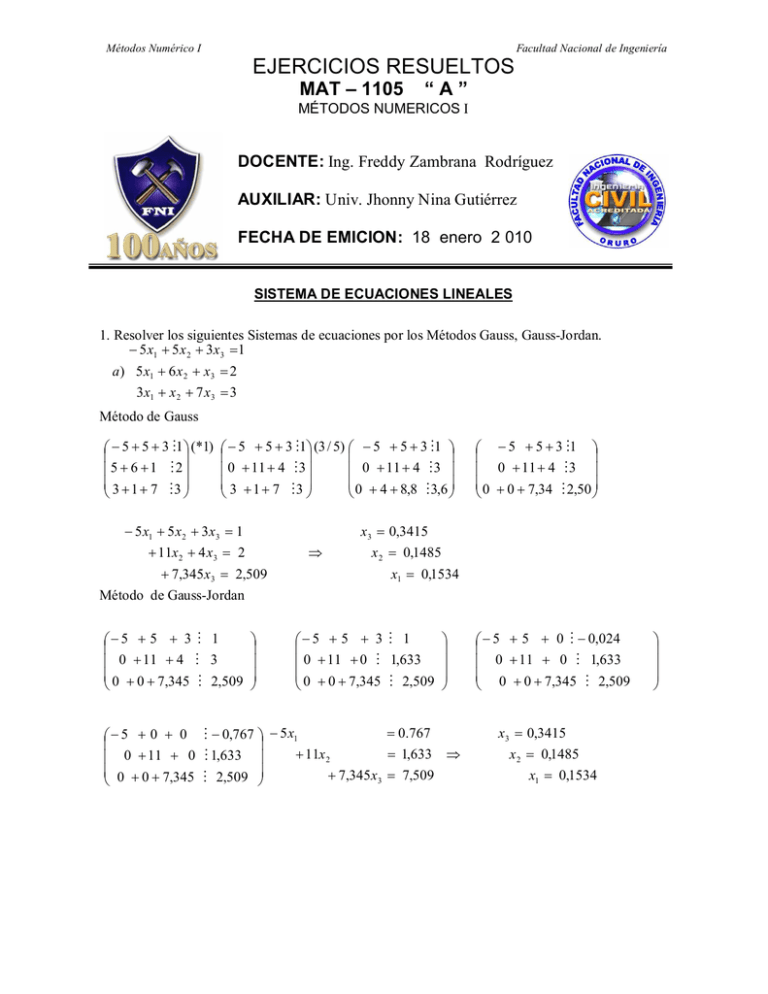
Métodos Numérico I Facultad Nacional de Ingeniería EJERCICIOS RESUELTOS MAT – 1105 “A” MÉTODOS NUMERICOS I DOCENTE: Ing. Freddy Zambrana Rodríguez AUXILIAR: Univ. Jhonny Nina Gutiérrez FECHA DE EMICION: 18 enero 2 010 SISTEMA DE ECUACIONES LINEALES 1. Resolver los siguientes Sistemas de ecuaciones por los Métodos Gauss, Gauss-Jordan. − 5 x1 + 5 x 2 + 3 x3 =1 a ) 5 x1 + 6 x 2 + x3 = 2 3 x1 + x 2 + 7 x3 = 3 Método de Gauss − 5 + 5 + 3 M1 (*1) 5 + 6 + 1 M2 3 + 1 + 7 M3 − 5 + 5 + 3 M1 (3 / 5) − 5 + 5 + 3 M1 0 + 11 + 4 M3 0 + 11 + 4 M3 3 + 1 + 7 M3 0 + 4 + 8,8 M3,6 − 5 x1 + 5 x2 + 3 x3 = 1 + 11x2 + 4 x3 = 2 + 7,345 x3 = 2,509 ⇒ − 5 + 5 + 3 M1 0 + 11 + 4 M3 0 + 0 + 7,34 M 2,50 x3 = 0,3415 x 2 = 0,1485 x1 = 0,1534 Método de Gauss-Jordan − 5 + 5 + 3 M 1 0 + 11 + 4 M 3 0 + 0 + 7,345 M 2,509 − 5 + 5 + 3 M 1 0 + 11 + 0 M 1,633 0 + 0 + 7,345 M 2,509 = 0.767 − 5 + 0 + 0 M − 0,767 − 5 x1 + 11x 2 = 1,633 ⇒ 0 + 11 + 0 M 1,633 0 + 0 + 7,345 M 2,509 + 7,345 x3 = 7,509 − 5 + 5 + 0 M − 0,024 0 + 11 + 0 M 1,633 0 + 0 + 7,345 M 2,509 x3 = 0,3415 x 2 = 0,1485 x1 = 0,1534 Métodos Numérico I Facultad Nacional de Ingeniería 2 x1 − 3 x 2 + x3 = 1 b) 3 x1 + 1x 2 − x3 = 2 2 − 3 + 1M 1 3 + 1 −1 M 2 1− 1 −1 M 1 x1 − x2 − x3 = 1 Método de Gauss 2 − 3 +1 M 1 0 + 5,5 − 2,5 M 0,5 0 + 0,5 − 1,5 M 0,5 x + 2y − z = 4 c) 1 + 2 −1 M 4 2 x + 1y − z = 8 2 + 1 + 1 M 8 − y = 2 z − x 1 + 1 − 2 M0 1+ 2 0 M 6 0−3 0 M −6 0 0 − 2 M − 4 1+ 2 −1 M 4 0−3+3M 0 0 − 1 − 1 M − 40 x1 = 0,5714 1+ 2 −1 M 4 0−3+3M 0 0 0 − 2 M − 4 x=2 − 3 y = −6 ; − 2 z = −4 y =2 ; z = 2 1 + 1 + 1 M6 1 + 2 − 1M 2 2 − 1 + 3M 9 x + 2y − z = 2 2 x − y + 3z = 9 x3 = − 0,357 x 2 = − 0,071 − x3 = 1 1 0 0 M2 0−3 0 M −6 ⇒ 0 0 − 2 M − 4 x + y + z =6 d) 2 x1 − 3 x 2 + x3 =1 + 1x 2 − x3 = 2 ⇒ 2 − 3 +1 M 1 0 + 5,5 − 2,5 M 0,5 0 + 0 − 1,272M 0,454 1 + 1 + 1 M6 0 + 1 − 2M − 4 0 − 3 + 1M − 3 1 + 1 + 1 M6 0 + 1 − 2M − 4 0 0 − 5 M − 15 x =1 y =2 x + y + z =6 + y − 2 z = −4 ⇒ z =3 − 5 = −15 2. Utilizar el método de Reducción de Crout para obtener una descomposición LU de la matriz A de los problemas: a) 2,510 − 0,142 0,754 A = − 1,210 3,440 0,231 2,510 − 0,142 0,754 a11 ⇒ a 21 a 31 a12 a 22 a 32 a13 a 23 a 33 L11 U 12 ⇒ L21 L22 L31 L32 U11 = U 22 = U 33 = 1 Calculo 1º Columna L L11 = 2,510; L21 = − 1,210; L31 = 2,510 Calculo de la primera fila de U. a − 0,142 U 12 = 12 = = −0,05657 2,510 L11 a13 0,754 = = 0,30039 L11 2,510 Calculo 2º columna de L L22 = a 22 − L21 * U 12 = 3,440 − (−1,210)(−0,05657) = 3,37155 U 22 = L32 = a 32 − L31 * U 12 = −0,142 − (2,510)(−0,05657) = 9,3 * 10 − 6 Calculo de la segunda fila de U. U 23 = a 23 − L 21 * U L 22 Aux. Jhonny-Nina-Gutiérrez 13 = U 13 U 23 L33 0 , 231 − ( − 1 , 210 )( 0 , 30039 3 , 37155 Pág. 2/11 ) = 0 ,1763 Métodos Numérico I Facultad Nacional de Ingeniería Calculo 3º columna de L L33 = a 33 − L31 * U 13 − L32 * U 23 = 0,754 − ( 2,510)(0,30039) − ( −9,3 * 10 −6 )(0,1763) = 2,2739 Matriz LU − 0,05657 0,30039 2,510 − 1,210 3,37155 0,1763 2,510 − 0,0000093 2,2739 b) 3,142 − 2,458 0,7542 A = − 1,154 5,258 − 0,4385 2,374 − 7,518 − 3,246 a11 ⇒ a 21 a 31 a12 a 22 a 32 L11 U 12 ⇒ L21 L22 L31 L32 a13 a 23 a 33 U 13 U 23 L33 U11 = U 22 = U 33 = 1 Calculo 1º Columna L L11 = 3,142; L21 = − 1,154; L31 = 2,374 Calculo de la primera fila de U. a − 2,458 = −0,7823 U 12 = 12 = 3,142 L11 a13 0,7542 = = 0,24003 3,142 L11 Calculo 2º columna de L L22 = a 22 − L21 * U 12 = 5,258 − (−1,154)(−0,7823) = 4,3552 U 22 = L32 = a 32 − L31 * U 12 = −7,518 − (2,374)( −0,7823) = −5.6608 Calculo de la segunda fila de U. U 23 = a 23 − L 21 * U L 22 13 = − 0 , 4385 − ( − 1 ,154 )( 0 , 24003 4 , 3552 ) = − 0 , 03708 Calculo 3º columna de L L33 = a 33 − L31 * U 13 − L32 * U 23 = −3,246 − ( 2,374)(0,24003) − ( −5,6008)( −0,03708) = −4,0257 Matriz LU 3,142 − 0,7823 0,24003 − 1,154 4,3552 − 0,03708 2,374 − 5,6608 − 4,0257 3. Para el Sistema resolver por descomposición de LU. 1 1 − 1 1 A = 2 − 2 1 ;b = 6 1 0 0 3 a11 ⇒ a 21 a 31 a12 a 22 a 32 a13 b1 L11 U 12 a 23 b2 ⇒ L21 L22 L a 33 b3 31 L32 Primera fila U: U11 = U 22 = U 33 = 1 Primera Columna L: Aux. Jhonny-Nina-Gutiérrez Ax = b L11 =1; L21 = 2; L31 = 1 Pág. 3/11 U 13 U 14 U 23 U 24 L33 U 34 Métodos Numérico I Facultad Nacional de Ingeniería Primera fila de U: 1 −1 1 = 1; U 13 = = −1; U 14 = = 1 1 1 1 Segunda Columna L: U 12 = L22 = − 2 − 2(1) = −4 ; L32 = 0 − 1(1) = −1 Segunda Fila de U: 1 − (2)(−1) 3 6 − (2)(1) 4 = − = −0,75; U 24 = = − = −1 −4 4 4 −4 Tercera Columna de L: L33 = 3 − (1)(−1) − (−1)(−3 / 4) = 3,25 U 23 = Tercera fila de U: 0 − 1(1) − (−1)(−1) 2 =− = −0,6153 3,25 3,25 Matriz LU: 1 1 −1 1 2 − 4 − 0,75 − 1 1 − 1 3,25 − 0,6153 1 Como: U11 = U 22 = U 33 = 1 tenemos U = 0 0 U 34 = x1 + x 2 − x3 =1 ⇒ x1 = − x 2 + x3 + 1 + x 2 − 0,75 x3 = − 1 ; −1 1 1 − 0,75 0 1 − 0,6153 1 −1 x3 = − 0,6153 ⇒ x 2 = − 1,4614 x1 =1,8461 4.Se tiene un numero positivo de tres cifras, la suma, de sus tres cifrases 22, el numero de centenas menos el numero de decenas es uno y el numero de decenas menos el numero de unidades es menos tres, ¿Cuál es el numero? n0 = x y z x + y + z = 22 x - y = 1 y - z = -3 1 22 1 1 1 22 1 22 1 1 1 22 1 1 1 1 1 −1 0 1 ≈ 0 − 2 −1 0 ≈ 0 1 −1 − 3 ≈ 0 1 −1 − 3 0 1 − 1 − 3 0 1 − 1 0 0 − 2 − 1 − 21 0 0 − 3 − 27 x + y + z = 22 x - y = -3 - 3z = -27 Aux. Jhonny-Nina-Gutiérrez z =9 ⇒ y =6 x =7 El numero es 769 Pág. 4/11 Métodos Numérico I Facultad Nacional de Ingeniería 5. Resuelva el siguiente Sistema de Ecuaciones lineales: 2 k j =0 0 ∑ ∫ x j dx x j = k ; k = 1, 2 ,3 x 0 dx x + 1x 1 dx x + 1x 2 dx x = 1 ∫0 0 ∫0 1 ∫0 2 1 2 x 0 dx x + 2 x 1 dx x + 2 x 2 dx x = 2 ∫0 0 ∫0 1 ∫0 2 3 x 0 dx x + 3 x 1 dx x + 3 x 2 dx x = 3 ∫0 0 ∫0 1 ∫0 2 1 1 x1 + x 2 = 1 2 3 8 2 x 0 + 2 x1 + x 2 = 2 3 9 3 x 0 + x1 + 9 x 2 = 3 2 x0 + Gauss. 1 0,5 0,333 1 1 0,5 0,333 1 1 0,5 0,333 1 2 2 2,667 2 ≈ 0 1 2,001 0 ≈ 0 1 2,001 0 3 4,5 9 3 0 3 8,001 0 0 0 1,998 0 x1 + 0.5 x 2 + 0,333x3 = 1 x 2 + 2,001x3 = 0 x3 = 0 ⇒ x2 = 0 x1 =1 1,998x 3 = 0 6. Sea el Sistema de Ecuaciones 3 1 10 A = 5 − 10 3 ;b = 1 3 10 14 − 5 14 0 ; x = 0 0 0 a11 ⇒ a 21 a 31 a12 a 22 a32 a13 b1 L11 U 12 a 23 b2 ⇒ L21 L22 L a33 b3 31 L32 U 13 U 14 U 23 U 24 L33 U 34 Resuelva el Sistema A x = b mediante el método de Jacobi y Gauss-Seidel y compare las soluciones y deduzca cual converge más rápidamente, con una tolerancia de error = 0,0001 10 x1 + 3 x 2 + 1x3 =14 5 x1 − 10 x 2 + 3 x3 = −5 x1 + 3 x 2 + 10 x3 =14 Método Jacobi. − 3 x 2 − 1x3 + 14 10 5 + 5 x1 + 3 x3 x2 = 10 14 − x1 − 3 x 2 x3 = 10 x1 = Aux. Jhonny-Nina-Gutiérrez Pág. 5/11 Métodos Numérico I Facultad Nacional de Ingeniería 1º Iteración x0=[0,0,0]t ^ error=0,0001 14 − 3(0) − (0) x1 ' = = 1,4 10 5 + 5(0) + (0) x2 ' = = 0,5 10 14 − 0 − 3(0) x3 ' = = 1,4 10 ( x10 − x11 ) 2 + ( x 20 − x 12 ) 2 + ( x 30 − x31 ) 2 < ε error (0 − 1,4) 2 + (0 − 0,5) 2 + (0 − 1,4) 2 < ε 2,042057 < ε 2º Iteración x1 = [1.4,0.5,1.4]t ^ error=0,0001 14 − 3(0,5) − (1,4) = 1,11 10 5 + 5(1,4) + 3(1,4) 2 x2 = = 1,62 10 14 − 1,4 − 3(0,5) 2 x3 = = 1,11 10 x1 = 2 error ( x11 − x12 ) 2 + ( x 12 − x 22 ) 2 + ( x 31 − x 32 ) 2 < ε (1, 4 − 1,11) 2 + (0,5 − 1,62 ) 2 + (1,4 − 1,11) 2 < ε 1,192727 < ε Tabulando i 0 1 2 3 4 5 6 7 8 9 10 11 12 13 14 15 16 Aux. Jhonny-Nina-Gutiérrez no cumple x1i x1i x1i 0 1,4 1,11 0,803 0,9033 0,96695 0,936513 0,9242807 0,932808 0,9348917 0,9326367 0,932362 0,932930 0,932939 0,932802 0,932814 0,932845 0 0,5 1,62 1,388 1,1424 1,22264 1,27356 1,249210 1,239424 1,246247 1,247913 1,246709 1,245889 1,246344 1,246351 1,246242 1,246251 0 1,4 1,11 0,803 0,9033 0,96695 0,936513 0,9242807 0,932808 0,9348917 0,9326367 0,932362 0,932930 0,932939 0,932802 0,932814 0,932845 Pág. 6/11 Error 0 2,042 1,1927 0,4922 0,2836 0,1205 0,0666 0,0298 0,0155 0,0074 0,0035 0,0018 0,00083 0,00045 0,00019 0,00011 0,000045< Error Métodos Numérico I Facultad Nacional de Ingeniería Método de Gauss-Seidel. 14 − 3 x 2 − x3 10 5 + 5 x1 + 3 x3 x2 = 10 14 − x1 − 3 x 2 x3 = 10 x0 = [0,0,0]t error=0,0001 x1 = 1º Iteración 14 − 3(0) − (0) = 1,4 10 5 + 5(1,4) + (0) x2 ' = = 1,2 10 14 − 1,4 − 3(1,2) x3 ' = = 0,9 10 x1 ' = ( x10 − x11 ) 2 + ( x 20 − x 12 ) 2 + ( x30 − x31 ) 2 < ε error (0 − 1, 4) 2 + (0 − 1,2) 2 + (0 − 0,9) 2 < ε 2,051828 < ε 2º Iteración x1 = [1.4,1.2,0.9]t ^ error=0,0001 14 − 3(1,2) − (0,9) = 0,95 10 5 + 5(0,9) + 3(0,9) 2 x2 = = 1,245 10 14 − 0,9 − 3(1,2) 2 x3 = = 0,9315 10 x1 = 2 ( x11 − x12 ) 2 + ( x 12 − x 22 ) 2 + ( x31 − x32 ) 2 < ε error (1,4 − 0,95) 2 + (1,2 − 1, 245) 2 + (0,9 − 0,9315 ) 2 < ε 0,45334 < ε no cumple Tabulando i 0 1 2 3 4 5 x1i x1i 0 1,4 0,95 0,9333 0,9328 0,93283 0 1,2 1,245 1,2461 1,24628 1,246263 x1i 0 0,9 0,9315 0,932827 0,932825 0,932837 Error 0 2,0518 0,4533 0,0167 0,00049 0,000056< Error La solución por el método de Gauss-Seidel es: (x1 = 0,93283; x2 = 1,246263; x3=0,932837) en 5 iteraciones método de Jacobi es (x1 = 0,932845; x2 = 1,246251; x3=0,932845) en 16 iteraciones. En conclusión el método de Gauss Seidel comienza mucho mas rápido. Aux. Jhonny-Nina-Gutiérrez Pág. 7/11
